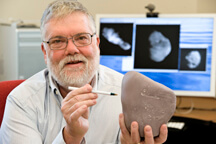Professor Melosh selected as Purdue's 2014 McCoy Award winner
June 17, 2014
 |
|
Jay Melosh |
WEST LAFAYETTE, Ind. - Jay Melosh, a distinguished professor internationally known for his work on impact cratering, planetary tectonics, and the physics of earthquakes and landslides, is the 2014 recipient of the Herbert Newby McCoy Award, the most prestigious research honor in the natural sciences given by Purdue University.
Melosh, a distinguished professor in the College of Science's Department of Earth, Atmospheric and Planetary Sciences, will be formally recognized this fall during the McCoy Distinguished Lecture at 3:30 p.m. on Nov. 19. Melosh also has professorship appointments with the Department of Physics and Astronomy and the School of Aeronautics and Astronautics.
"Although professor Melosh has been the recipient of many awards and honors during his stellar career, we highlight several recent outstanding contributions to planetary research that typify the depth and breadth of what we value in our Herbert Newby McCoy Award winners," Purdue President Mitch Daniels said in announcing this year's winner. "His work has been instrumental in discovering vital information - from the global effects of meteorite impacts on Earth to the possibility that life could have hopped from Mars to Earth or vice versa."
Melosh's research focuses on numerical modeling of the physics and chemistry of impacts at scales ranging from the Deep Impact event on comet Tempel 1 to the Mars-size object that impacted the Earth 4.5 billion years ago and created our moon. He also studies the exchange of microorganisms between the planets and the origin of life. His recent research includes studies of the K/T impact that extinguished the dinosaurs and the ejection of rocks from their parent bodies.
"I'm certainly honored and humbled to join the fraternity of past McCoy Award winners at Purdue University who share a love of research and celebrate those days in the laboratory with our students when we realize we might be onto something that will provide a deeper understanding of our universe," Melosh said.
Melosh joined the Purdue faculty in 2009 after spending 27 years at the University of Arizona's Lunar and Planetary Laboratory/Department of Planetary Sciences.
He is part of NASA's Deep Impact mission that created a 50-m diameter impact crater on Comet Tempel 1 on July 4, 2005, the NExT mission that returned to Tempel 1 in 2011, the DIXI mission to comet Hartley-2, and the GRAIL mission to obtain high-precision data on our moon's gravity field. Asteroid #8216 was named "Melosh" in his honor.
He has published more than 170 technical papers, edited two books and is the author of a major monograph, "Impact Cratering: A Geologic Process." During his time at Purdue, he wrote a textbook on planetary science, titled "Planetary Surface Processes," which was published in 2011 by Cambridge University Press.
He also co-authored two National Research Council reports while at Purdue: "Defending Planet Earth: Near-Earth-Object Surveys and Hazard Mitigation Strategies" in 2010 and "NASA Space Technology Roadmaps and Priorities" in 2012.
Melosh is a fellow of the Meteoritical Society, the Geological Society of America, the American Geophysical Union and American Association for the Advancement of Science. He was awarded the Barringer Medal of the Meteoritical Society in 1999, the Gilbert prize of the Geological Society of America in 2001 and the Hess Medal of the American Geophysical Union in 2008.
He was a Guggenheim Fellow in 1996-1997; a Humboldt Fellow at the Bavarian Geological Institute in Bayreuth, Germany, in 2005-2006; and was elected to the U.S. National Academy of Sciences in 2003 and the American Academy of Arts and Sciences in 2011. He received his bachelor's degree in physics from Princeton University and his doctorate in physics and geology from the California Institute of Technology.
The McCoy Award, established in 1964 by Ethel Terry McCoy in memory of her husband, is presented annually to a Purdue student or faculty member for outstanding contributions to the natural sciences. The winner, who is nominated by colleagues and selected by faculty representatives and the university president, receives a $4,000 cash award and a $7,000 allocation for university scholarly activities.
Writers: Phillip Fiorini, 765-496-3133, pfiorini@purdue.edu
Anna Schultz, 812-447-5229, schult70@purdue.edu
Sources: Mitch Daniels, president@purdue.edu
Jay Melosh, 765-494-3290, jmelosh@purdue.edu

